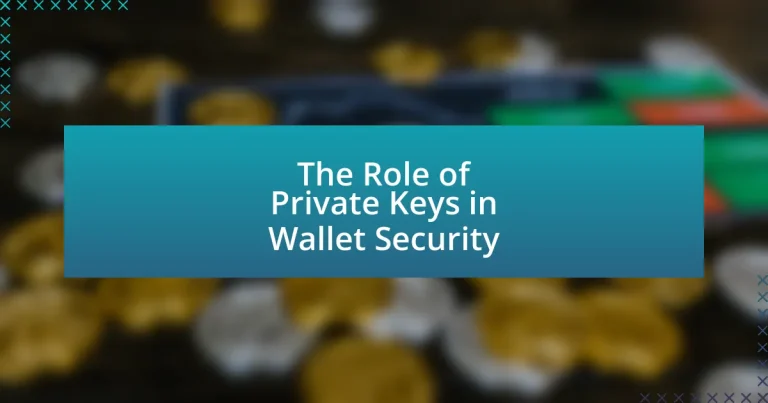Private keys are essential cryptographic components that secure cryptocurrency wallets by allowing users to access and manage their digital assets. This article explores the significance of private keys in wallet security, detailing their function in transaction authorization, the relationship between private and public keys, and the various methods of generation and storage. It also examines the risks associated with losing private keys, the types of wallets that utilize them, and best practices for enhancing wallet security. Additionally, the article addresses common mistakes in private key management and provides insights into recovery options for lost keys, emphasizing the critical role private keys play in safeguarding digital assets.

What are Private Keys and Their Importance in Wallet Security?
Private keys are cryptographic keys that allow users to access and manage their cryptocurrency wallets securely. They are essential for wallet security because they provide the means to sign transactions and prove ownership of the associated digital assets. Without the private key, users cannot access their funds, making it a critical component of wallet security. The loss or theft of a private key can result in the irreversible loss of assets, as there is no central authority to recover them. Therefore, safeguarding private keys through secure storage methods, such as hardware wallets or encrypted backups, is vital to protect against unauthorized access and potential financial loss.
How do private keys function within cryptocurrency wallets?
Private keys function as the essential cryptographic keys that allow users to access and manage their cryptocurrency holdings within wallets. Each cryptocurrency wallet generates a unique private key, which is a long string of alphanumeric characters, and this key is crucial for signing transactions and proving ownership of the associated digital assets. Without the private key, users cannot authorize transactions, making it impossible to transfer or spend their cryptocurrencies. The security of a wallet is directly tied to the protection of its private key; if someone gains access to the private key, they can control the funds in that wallet. Therefore, safeguarding the private key is paramount for maintaining wallet security and preventing unauthorized access to cryptocurrencies.
What is the relationship between private keys and public keys?
Private keys and public keys are cryptographic pairs used in asymmetric encryption, where the private key is kept secret and the public key is shared openly. The relationship is that the private key generates the public key, allowing secure communication; data encrypted with the public key can only be decrypted by the corresponding private key. This mechanism ensures that only the holder of the private key can access or control the assets associated with the public key, thereby providing security in digital transactions and wallet management.
How are private keys generated and stored?
Private keys are generated using cryptographic algorithms, typically through processes like random number generation or deterministic algorithms such as the Elliptic Curve Digital Signature Algorithm (ECDSA). These keys are stored securely in various ways, including hardware wallets, software wallets, or paper wallets, ensuring that they remain inaccessible to unauthorized users. The security of private keys is critical, as their exposure can lead to the loss of associated cryptocurrency assets. For instance, hardware wallets store private keys offline, significantly reducing the risk of hacking compared to online storage methods.
Why are private keys critical for securing digital assets?
Private keys are critical for securing digital assets because they serve as the unique cryptographic keys that grant access to and control over those assets. Without the private key, an individual cannot authorize transactions or access their digital currency or tokens, making it essential for safeguarding against unauthorized access. The security of digital assets relies on the mathematical principles of public-key cryptography, where the private key is kept secret while the corresponding public key can be shared openly. If a private key is compromised, the associated digital assets can be stolen, as anyone with access to the private key can manipulate or transfer the assets at will. Therefore, the integrity and confidentiality of private keys are paramount in ensuring the security of digital wallets and the assets they contain.
What risks are associated with losing a private key?
Losing a private key poses significant risks, primarily the irreversible loss of access to the associated cryptocurrency or digital assets. Without the private key, users cannot sign transactions or prove ownership, effectively rendering their assets inaccessible. This risk is underscored by the fact that many cryptocurrencies, such as Bitcoin, operate on a decentralized model where there is no recovery mechanism for lost keys. According to a study by Chainalysis, approximately 20% of all Bitcoin in circulation is believed to be lost due to lost private keys, highlighting the critical importance of secure key management.
How do private keys prevent unauthorized access to wallets?
Private keys prevent unauthorized access to wallets by serving as unique cryptographic codes that authenticate the owner’s identity. Each wallet is secured by a private key, which is required to sign transactions and access the funds within the wallet. Without the correct private key, any attempt to access or transfer assets from the wallet is denied, ensuring that only the rightful owner can control their funds. This security mechanism is fundamental to blockchain technology, as it relies on asymmetric encryption, where the private key is kept secret while the corresponding public key is shared. The integrity of this system is reinforced by the fact that losing or exposing the private key can lead to irreversible loss of access to the wallet, highlighting the importance of safeguarding these keys.

What Types of Wallets Utilize Private Keys?
Wallets that utilize private keys include hardware wallets, software wallets, and paper wallets. Hardware wallets, such as Ledger and Trezor, store private keys offline, providing enhanced security against online threats. Software wallets, which can be desktop or mobile applications, manage private keys on the device, allowing for easier access but potentially exposing them to malware. Paper wallets involve printing the private key on paper, ensuring it is stored offline, but they can be lost or damaged. Each type of wallet relies on private keys to authorize transactions and secure cryptocurrency holdings, making them essential for wallet security.
What are the different types of cryptocurrency wallets?
There are three main types of cryptocurrency wallets: hardware wallets, software wallets, and paper wallets. Hardware wallets are physical devices that securely store private keys offline, making them less vulnerable to hacking; examples include Ledger and Trezor. Software wallets, which can be desktop, mobile, or web-based, store private keys on devices or in the cloud, offering convenience but with varying levels of security; popular options include Exodus and Coinbase. Paper wallets involve printing private keys on paper, providing a completely offline storage method, but they require careful handling to avoid loss or damage. Each type of wallet serves different security and accessibility needs, reflecting the diverse preferences of cryptocurrency users.
How do hardware wallets manage private keys?
Hardware wallets manage private keys by securely generating, storing, and using them in an isolated environment. These devices create private keys offline, ensuring they are never exposed to the internet, which significantly reduces the risk of hacking. The keys are stored in a secure element, a tamper-resistant chip designed to protect sensitive data. When a transaction is initiated, the hardware wallet signs it internally without revealing the private key, allowing users to maintain control over their assets while minimizing exposure to potential threats. This method of key management is validated by the fact that hardware wallets are widely recognized for their enhanced security compared to software wallets, as they mitigate risks associated with malware and phishing attacks.
What role do software wallets play in private key security?
Software wallets play a crucial role in private key security by securely storing and managing private keys used for cryptocurrency transactions. These wallets utilize encryption techniques to protect private keys from unauthorized access, ensuring that only the wallet owner can access their funds. For instance, many software wallets implement features such as password protection, biometric authentication, and two-factor authentication to enhance security. Additionally, software wallets often allow users to back up their private keys, providing a recovery option in case of device loss or failure. This combination of encryption and user-controlled security measures makes software wallets an essential component in safeguarding private keys and, consequently, the assets associated with them.
What are the advantages and disadvantages of each wallet type?
Hardware wallets offer high security due to their offline storage of private keys, making them less vulnerable to hacking. However, they can be expensive and less convenient for frequent transactions. Software wallets, including mobile and desktop options, provide ease of use and quick access but are more susceptible to malware and phishing attacks. Paper wallets are highly secure when generated offline, but they can be easily lost or damaged, and recovering funds can be complicated. Each wallet type presents a trade-off between security and convenience, impacting user choice based on individual needs and risk tolerance.
How does the security of hardware wallets compare to software wallets?
Hardware wallets provide superior security compared to software wallets due to their offline storage of private keys. Hardware wallets store private keys in a secure chip, making them immune to online hacking attempts, while software wallets, which store keys on internet-connected devices, are vulnerable to malware and phishing attacks. According to a study by the European Union Agency for Cybersecurity, hardware wallets significantly reduce the risk of unauthorized access, as they require physical confirmation for transactions, unlike software wallets that can be compromised remotely.
What are the potential vulnerabilities of online wallets regarding private keys?
Online wallets face several potential vulnerabilities regarding private keys, primarily due to their reliance on internet connectivity and centralized storage. These vulnerabilities include exposure to hacking, phishing attacks, and inadequate security measures by wallet providers. For instance, centralized servers can be targeted by cybercriminals, leading to unauthorized access to private keys. A notable example is the 2014 Mt. Gox hack, where approximately 850,000 Bitcoins were stolen due to compromised private keys. Additionally, users may fall victim to phishing schemes that trick them into revealing their private keys. Research indicates that 70% of cryptocurrency thefts are attributed to phishing attacks, highlighting the significant risk associated with online wallets.

How Can Users Enhance Wallet Security with Private Keys?
Users can enhance wallet security with private keys by implementing strong encryption and secure storage practices. Utilizing hardware wallets, which store private keys offline, significantly reduces the risk of hacking and unauthorized access. Additionally, users should generate private keys using reputable software that employs strong cryptographic algorithms, ensuring that the keys are not easily compromised. Regularly updating wallet software and using two-factor authentication further fortifies security measures. According to a report by the Cybersecurity & Infrastructure Security Agency, using hardware wallets can decrease the likelihood of theft by up to 90%, highlighting the effectiveness of these practices in safeguarding private keys and, consequently, wallet security.
What best practices should users follow to protect their private keys?
To protect private keys, users should employ several best practices, including using hardware wallets, enabling two-factor authentication, and regularly updating software. Hardware wallets store private keys offline, significantly reducing the risk of online theft, as evidenced by a study from the University of Cambridge, which found that hardware wallets are among the most secure methods for key storage. Enabling two-factor authentication adds an extra layer of security, making unauthorized access more difficult. Regularly updating software ensures that users benefit from the latest security patches, reducing vulnerabilities that could be exploited by attackers.
How can users securely back up their private keys?
Users can securely back up their private keys by using hardware wallets, encrypted USB drives, or secure paper backups. Hardware wallets store private keys offline, significantly reducing the risk of online theft, while encrypted USB drives provide an additional layer of security through encryption. Paper backups, when stored in a safe location, can also be effective, but they must be protected from physical damage and unauthorized access. According to a report by the Blockchain Research Institute, hardware wallets are considered one of the safest methods for storing private keys due to their resistance to malware and hacking attempts.
What methods can be employed to encrypt private keys?
Symmetric encryption and asymmetric encryption are two primary methods employed to encrypt private keys. Symmetric encryption uses a single key for both encryption and decryption, making it efficient for securing private keys, while asymmetric encryption utilizes a pair of keys (public and private) to enhance security by allowing the private key to remain confidential.
For instance, Advanced Encryption Standard (AES) is a widely used symmetric encryption algorithm that provides strong security for private keys, as it supports key lengths of 128, 192, and 256 bits, making it resistant to brute-force attacks. On the other hand, RSA (Rivest-Shamir-Adleman) is a common asymmetric encryption method that relies on the mathematical difficulty of factoring large prime numbers, ensuring that even if the public key is known, the private key remains secure.
These methods are validated by their extensive use in various security protocols, such as SSL/TLS for secure communications, demonstrating their effectiveness in protecting sensitive information like private keys.
What common mistakes do users make regarding private key management?
Common mistakes users make regarding private key management include storing private keys in insecure locations, failing to create backups, and sharing keys with untrusted parties. Storing private keys on devices connected to the internet increases the risk of hacking, while not backing up keys can lead to irreversible loss of access to funds. Additionally, sharing private keys, whether through phishing scams or casual conversations, exposes users to theft. According to a report by the Cybersecurity and Infrastructure Security Agency, 90% of successful cyberattacks involve human error, highlighting the critical need for secure private key management practices.
How can phishing attacks compromise private key security?
Phishing attacks can compromise private key security by tricking individuals into revealing their private keys through deceptive communications. Attackers often create fake websites or emails that mimic legitimate services, prompting users to enter sensitive information, including private keys. According to a report by the Anti-Phishing Working Group, phishing attacks have increased significantly, with over 200,000 unique phishing sites reported in a single quarter of 2021, highlighting the prevalence of this threat. When users unknowingly provide their private keys to these fraudulent platforms, attackers gain unauthorized access to their wallets, leading to potential financial loss and theft of digital assets.
What are the implications of sharing private keys with others?
Sharing private keys with others leads to a complete loss of control over one’s digital assets. When a private key is shared, the recipient gains full access to the associated wallet, allowing them to transfer or spend the assets without the original owner’s consent. This risk is underscored by the fact that private keys are designed to be confidential; their security is paramount in protecting cryptocurrencies and other digital assets. According to a study by Chainalysis, over 70% of cryptocurrency thefts are attributed to compromised private keys, highlighting the severe implications of sharing them.
What are the practical steps for recovering lost private keys?
To recover lost private keys, the first practical step is to check any backup methods previously established, such as hardware wallets, paper wallets, or cloud storage. If backups are unavailable, users should search for any mnemonic phrases or seed phrases associated with the wallet, as these can regenerate the private keys. Additionally, users can explore wallet recovery tools or software that may assist in retrieving lost keys, provided they have access to the wallet’s address or transaction history. It is crucial to remember that without a backup or recovery phrase, recovering lost private keys is generally impossible, as private keys are not stored on the blockchain and cannot be retrieved from it.
How can users utilize recovery phrases for wallet access?
Users can utilize recovery phrases for wallet access by entering the phrase into a compatible wallet application during the recovery process. Recovery phrases, also known as seed phrases, consist of a series of words generated when a wallet is created, allowing users to restore access to their cryptocurrency holdings if they lose their device or forget their password. This method is secure because it provides a way to regenerate the private keys associated with the wallet, ensuring that users can regain control over their assets. The importance of recovery phrases is underscored by the fact that losing access to them can result in permanent loss of funds, as there is no central authority to recover lost private keys.
What tools are available for private key recovery?
Tools available for private key recovery include hardware wallets, recovery phrase generators, and specialized software applications. Hardware wallets, such as Ledger and Trezor, often provide recovery options through seed phrases that can restore access to private keys. Recovery phrase generators can help users recreate lost seed phrases if they have partial information. Additionally, software applications like MyEtherWallet and Exodus offer recovery features that assist users in retrieving their private keys through secure methods. These tools are widely recognized in the cryptocurrency community for their effectiveness in private key recovery.





